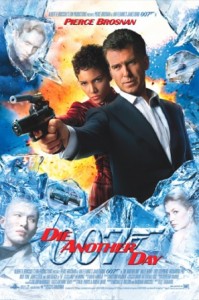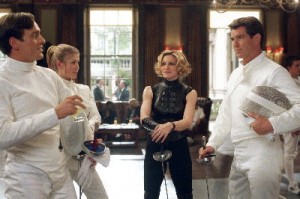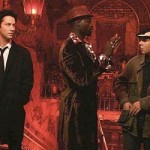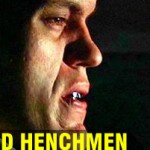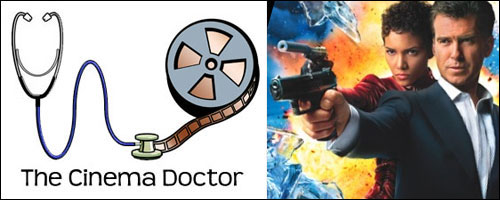
Previously, The Cinema Doctor bravely traveled into potentially life-threatening territory to deliver his diagnosis of The League of Extraordinary Gentlemen. Now he dares to take on the debonair British super spy, James Bond: 007, as he examines the fortieth anniversary debacle Die Another Day.
TODAY’S PATIENT:
Die Another Day
Directed by Lee Tamahori
Starring: Pierce Brosnan, Halle Berry, Toby Stephens, Rosamund Pike, Judi Dench, John Cleese, Rick Yune, Michael Madsen, Will Yun Lee
PATIENT DESCRIPTION: The twentieth James Bond film begins with 007 getting captured and imprisoned in a North Korean prison for eighteen months when he kills the son of a high ranking General. After Bond is traded for his freedom, he begins investigating the origins of a billionaire’s fortune. What he uncovers links back to the incidents in Korea, but how?
EXAMINATION:
HEALTHY ASPECTS:
- The opening sequence ends on a very bold note of Bond getting captured and imprisoned. We’re so used to Bond being able to escape from anything, so it takes us off guard that he was willing to stay imprisoned for Queen and Country.
- Brosnan still shows fantastic dedication to the role of James Bond. Despite his evident age, he still exudes the essential qualities that make a topnotch Bond.
- The character of Jinx is a vast improvement over Christmas Jones in The World Is Not Enough. The same goes for the actress too. To be a Bond girl is considered an honor for the actresses who play them. Say what you will about Halle Berry, but she had the right stuff to be a Bond Girl, and she knew it.
- John Cleese’s solo effort as the new Q is quite successful and never diminishes the memory of Desmond Llewelyn.
- The car chase scene on the ice is brilliantly staged, and the new car is the most tricked out car to date.
- Production design wielded some positives. The ice palace is an outstanding example.
- The final fight between Jinx and Miranda Frost is deliciously catty and reaches a finish that is both appropriate and ironic.
- The movie rewards long time fans by making continuous references to every other Bond film that came before it.
EARLY ASSESSMENT: This film was meant to be a fortieth anniversary celebration of of the 007 film franchise, and this entry into the series is definitely a nostalgia trip. If you look hard you’ll be able to pinpoint references to all of them. It’s blatantly clear that the intention of the film was to bring back a little bit of that old-school feel of the franchise by combining the outrageous plots of classics like Diamonds Are Forever, You Only Live Twice, and The Spy Who Loved Me, and the latter day political intrigue of The Living Daylights, Goldeneye, and The World Is Not Enough.
SYMPTOMS:
- The villain’s scheme is totally ripped from Diamonds Are Forever (ie: threatening the world to ransom with a satellite armed with a laser). The only change is that instead of it being SPECTRE at the helm of this scheme, it’s a rogue Korean nutjob, masquerading as a British industrialist.
- Speaking of the rogue Korean, the plot revelation that the billionaire industrialist Gustav Graves is actually the Korean Colonel Moon is insipid beyond redemption. To expect us to believe that the two characters are the same man is far too reliant on the audiences ability to suspend their disbelief.
- The main problem with trying to bring back the classic over-the-top outrageousness of the old school Bond is that at the same time, filmgoers were reveling in the antics of the Austin Powers franchise. That trilogy’s mojo comes entirely from satirizing the very same campiness which littered the plots of earlier Bond films. As a result Die Another Day became a spoof of itself instead of being a genuine Bond thriller.
- Michael Madsen was disastrously wasted in the film. His character could’ve been the next Felix Leiter if the screenwriters had played their cards right.
- Many bits of action were extremely groan inducing, particularly Bond’s parasailing escape.
- Madonna’s cameo in the film severely wrecked the credibility of what could have been an outstanding scene in the fencing school. Her being cast in the scene reeked of “contractual obligation.”
- Frankly speaking, Madonna, you didn’t hold up your end of the contract. You were supposed to give us a theme song that doesn’t suck. When I hear lyrics like “I’m gonna avoid the cliche-” all I can think is, “Sure as hell not where this song is concerned.” Bond themes are supposed to be sexy, stylish, and bear promises of intrigue and action. If Madonna couldn’t even write a book about sex, what makes us think she can use her music to convey it. Madonna, please stick to writing music from your heart. You’re better at that. When you attempt to write music from your loins, it’s a pretty stinky venture.
- Another problem with being too over-the-top with the story, especially nowadays, is that as far as Bond is concerned it’s too out of place. The Bond franchise has always credited itself with being surprisingly gritty and politically aware. So if you’re going to do a story focusing on the turbulence in North and South Korea, please don’t cheapen it with a threat that belongs on an episode of Buck Rogers.
- The final fight between Bond and Graves/Moon is equally ridiculous. Earlier in the film we saw a very impressive swordfight between them, which gives the indication that Graves is an equal match for Bond in melee combat. So was it really necessary to have the villain cheat by wearing a stupid electric harness he swiped from The Shocker’s hideout.
- Lee Tamahori was a horrible choice for director. His repertoire contains a variety of feeble films with little inspiration and less imagination. With a Bond film, imagination is not only a pivotal component; it’s a priority.
- Though the character of Miranda Frost is played very well by Rosamund Pike, the plot development of her treason is visible from a mile away, sans telescope. Come on, you’ve got Jinx. Why do you need another female agent in the mix? Oh yeah, to inevitably be a turncoat and give Jinx someone to fight in the end. Another staple of 007 are villainesses, and Frost could have been one from the start. She didn’t need to put on the disguise.
DIAGNOSIS: Producius Slothoma
All of these symptoms stem from the essential fact that the producers became so set in their ways in the production of the Bond films that they thought that they defecated gold, as opposed to the feces that this film turned out to be. With the elevation of success in sci-fi and fantasy in cinema at that time, the producers thought that they could hop onto the bandwagon and attempt to use the Bond franchise to cash in. So they took the first draft of the script, reminded Pierce Brosnan that he’s still under contract, and used the franchise’s fortieth anniversary to reap the returns. This was all about the producers throwing a whole bunch of selling points into a big sloppy pile, and they just waited for it to solidify. Instead, all the selling points clashed disastrously and spoiled the integrity of one of the greatest film franchises in cinema history. To put it simply, the producers got so lazy they made the film a big, fat, slovenly mess.
ADVISE TREATMENTS:
- Force the writers to exercise their brains to tighten the script and make it healthier.
- Cut back on the excessive helpings of nostalgia. Only have little helpings over lengthy spans of time.
- Find a strong director with an exceptional knack for storytelling, and technical expertise to whip the film into shape. You know, Spielberg said he always wanted to direct a Bond film.
- Austin Powers already has the monopoly in the spy spoofing genre. Where movies are concerned it’s Monkey See, Monkey DON’T. Bond doesn’t need the pop culture sensibility to spoof itself. It should instead be creating pop culture for other films to spoof, as it has done in the past.
- Ditch the sugar coating on the whole Korean conflict plot.
- Give us a villain who’s less smarm and charm, and more intimidating.
- Change the musical habits to something a bit more motivational. Madonna has become a bit too full of herself to be considered a healthy source of melodic sustenance.
CAN THIS PATIENT BE SAVED?
We may be too far gone to save this one. It became too bloated from overindulgence. Fortunately the franchise will live on.


